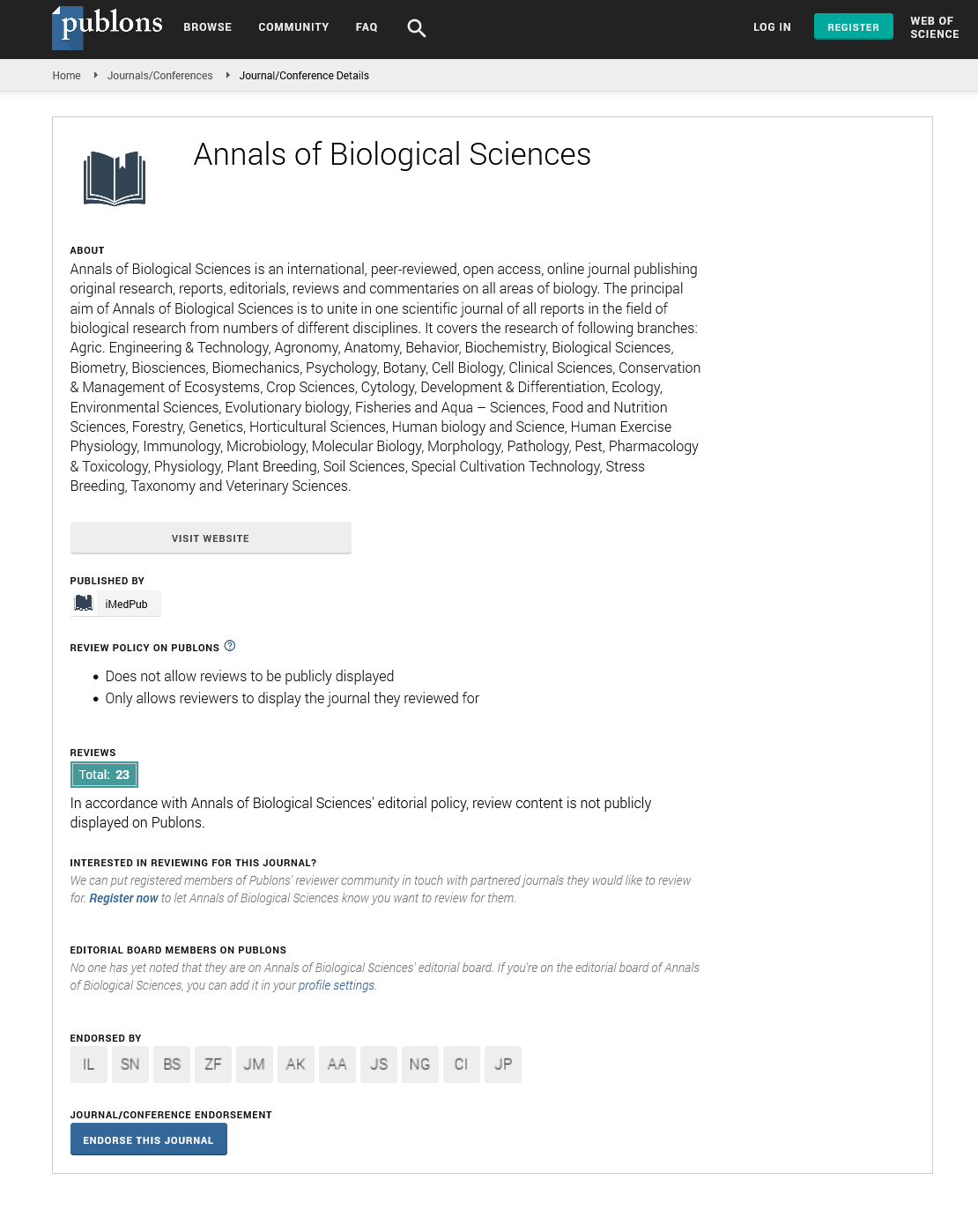ISSN : 2348-1927
Annals of Biological Sciences
Abstract
Acute and Subacute Effects of Aqueous Extract of Picralima nitida Seeds on Dexamethasone Induced Insulin Resistance in Rats
Background: Picralima nitida is a West African plant with varied applications in African folk medicine. Aqueous extract of seeds of Picralima nitida was used to evaluate its protective effect on dexamethasone-induced insulin-resistance in rats.
Methods and Findings: Male rats were divided into five groups for acute and subacute study. At the end of the acute study, Oral Glucose Tolerance Test was performed. For the subacute study, Groups 1 and 2 received distilled water for 11 days orally and from day 7, either saline or dexamethasone (8 mg/kg) intraperitoneally for the last 5 days. Groups 3, 4 and 5 were respectively pretreated with glibenclamide (10 mg/kg), P. nitida extract at the doses of 200 mg/kg or 400 mg/kg orally for 11 days. At the end of the experiment on day 12, blood was collected for biochemical analysis and the animals were subjected to a fasting glucose test and then thereafter sacrificed. The liver, pancreas, kidney, and adrenal were weighed and histological analysis performed. The Area Under the Curve (AUC) of the glucose tolerance test, performed 4 hours after the end of acute treatment at a dose of 400 mg/kg of the extract, was significantly reduced (p<0.01). In subacute treatment, the AUC of the aqueous extract of the seeds of Picralima nitida was significantly reduced at doses of 200 mg/kg and 400 mg/kg compared to rats treated with dexamethasone. Furthermore, there was a significant decrease in Total Cholesterol and LDL-Cholesterol with the extract treatment as well as with glibenclamide which decrease Total Cholesterol. Glibenclamide and the extract at 400 mg/kg prevented the drop in protein levels induced by dexamethasone. Adrenal atrophy was noted in all rats given dexamethasone, as well as increased liver and kidney weights. The pretreatment with the aqueous extract of the seeds of Picralima nitida prevented cytolysis and degeneration of hepatocyte, hypotrophy of the pancreatic islets and tubular and glomerular degeneration caused by dexamethasone.
Conclusions: This study reveals that the aqueous extract of the seeds of Picralima nitida has anti-hyperglycemic and antihypercholesterolemic properties that may justify its use in traditional medicine against diabetes abnormalities.
Author(s): Ariane Rose Nzodjou Mawout, Nyemb Nyunaï, Esther Ngo Lemba Tom, Aurélie Metsadjio Nguimmo, Fabrice Mba Medou
Abstract | Full-Text | PDF
Share This Article
Google Scholar citation report
Citations : 406
Annals of Biological Sciences received 406 citations as per Google Scholar report
Annals of Biological Sciences peer review process verified at publons
Abstracted/Indexed in
- Google Scholar
- China National Knowledge Infrastructure (CNKI)
- WorldCat
- Publons
- ROAD
- Secret Search Engine Labs
Open Access Journals
- Aquaculture & Veterinary Science
- Chemistry & Chemical Sciences
- Clinical Sciences
- Engineering
- General Science
- Genetics & Molecular Biology
- Health Care & Nursing
- Immunology & Microbiology
- Materials Science
- Mathematics & Physics
- Medical Sciences
- Neurology & Psychiatry
- Oncology & Cancer Science
- Pharmaceutical Sciences
